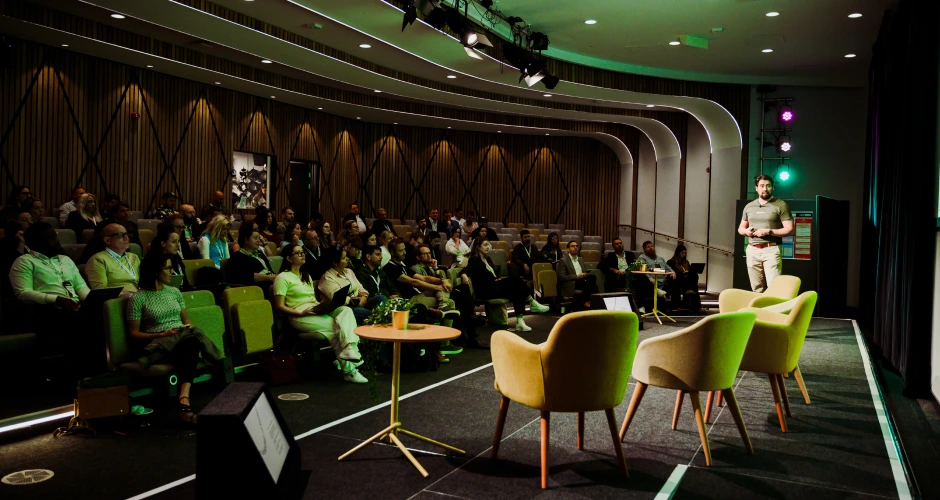The last day of X. Festival was probably the most unique: two tracks were available to be followed. One was packed with talks and presentations from the most visionary tourism leaders, the second one was a line-up of live roundtables aimed at answering the most debated questions in tourism.
Let’s recap on what we have seen on X. Imagine.
We travelled to the mountains with Alex Herrmann, Director of UK & Ireland at Switzerland Tourism, with another daily dose of Switzerland.
Isabel Mosk, a DTTT Experts and Tourism Consultant, has interviewed an exceptional person: Damcho Rinzin, Chief Marketing Officer of Tourism Council of Bhutan. They have discussed a destination model based on sustainability and happiness. Bhutan has created a wonderful balance in supporting tourism, residents and the economical, social and sustainable growth of the country. There is no fixed recipe for this but the main ingredient is definitely the happiness of the local community. To improve the value of tourism, the focus needs to be host communities. The focus is always Bhutan: even in managing the pandemic crisis, they have been one of the best examples. Managing the destination correctly has allowed increasing the interest in travellers that are asking themselves "where to next?": people want to travel to Bhutan because they know Bhutan is safe. When you travel as a leisure tourist, the ultimate goal is to have a good time. That is where the Tourism Council of Bhutan, ensuring local communities are happy, manages to guarantee a smooth and unforgettable travel experience for tourists.
Moving the attention to how we can reimagine, reinvent and redesign cities, we run an interview with Clyde Higgs, CEO of Atlanta Beltiline Inc. We asked how to support the urban revival and how to help our cities to remain not just interesting competitive and relevant for tourists, but also a service provider for residents. The work done by ABI is extraordinary: they worked on infrastructures, services, new investments, extensions for development that can interest different sectors. We often think tourism as an isolated aspect of the life of a city, but it is intrinsically linked with the life of the local community and all the "users" of the city. Atlanta is a global city and it is a destination from that perspective: Tech, Film, university, business, medicine industries are also very strong in Atlanta. There is a lot to offer, of course, and the culture in Atlanta is also particularly favourable to welcome people so that everyone can really enjoy the destination: There are tremendous diversity and inclusivity and these are some of the main strengths of the city, which all the community can benefit from.
Then, we stayed in North America but we travelled up north until we reached Jason Bent and Dominique Lapoint in Quebec, Canada. Jason works as a Tourism Cluster Manager in the Iles de la Madeleine; Dominic Lapointe is a professor and research leader in the Department of Urban and Tourism Studies at Université du Québec à Montréal. They have presented how they involved the whole community to shape the destination strategy. The DMO's mission takes into account the quality of life of the local population so they are committed to satisfying the needs of the islanders and meeting the expectations of the tourism businesses. The process to do so includes initial research collected from a sample of citizens and supported by the municipality. The public consultation represented a way to collect data but also educate and inform the population. The key to the success of the on-going work of Îles de la Madelaine is ensuring that everyone is "pulling in the same direction" working together to align different goals and success overall. The traditional way of looking at the strategy planning of the industry includes a SWOT or PESTEL analysis that present different factors; however, there is one factor that is common to all the aspects and this factor is the local community. This means that, as a destination manager, you cannot avoid to look into and support the needs of the local population, to ensure a successful and efficient destination strategy.
We, then, moved the attention to the topic of Smart Cities. What are Smart Cities today, where are they headed and what does that mean for tourism? Jonathan Reichental, Human Future, tried to answer this question. He reminds us that when we talk about the future of our cities, we need to bring into the conversation and engage with every part of society: children, families, tech companies, enterprises, academia, every age group, every demographic. How can we fall in love with our cities again? Cities will be popular destinations for tourists again at some point, but only those led by passionate and solution-driven people will thrive and attract tourism.
We continued the conversation on the topic of Smart Cities together with Marc Sanderson, City of Malaga, and Katarina Thorstensoon, Göteborg & Co. Both the destinations are European Capitals of Smart Tourism, but have been awarded for very different reasons: one has taken on a data-driven approach, the other is investing in sustainable development. Marc has presented what Malaga has worked on. The city has got a tremendous amount of open datasets, which were essential to creating a chatbot with an excellent level of interactivity. This has improved the level of information and accessibility of information for both domestic and eventually international audiences. This is a best practice of how technology can serve the need for 'human' interaction that is lacking so much right now. Göteborg's perspective is all about values and what the city is truly like. The human touch as always been important to them; technology has been a fantastic tool to enhance experiences and help with the decision making. However, being a smart city is not just about tech, but it is more about focusing on people who are going to benefit from that technological improvement. Warmth and inclusiveness are real values for the city of Göteborg: they truly believe in the IRL interaction between people. Accessibility to technology and transparency are also relevant values for the city: in Sweden, people are fairly tech-savvy and curious, and there is a good tech infrastructure to support and to increase the great potential for the tourism industry to benefit from technological improvements.
The following session was presented by UNWTO. Sustainability and innovation have to be part of the new normal, based on community inclusion, working on waste management, green investment, education, empowering the public and private sectors for new opportunities for youth and women. José Ricardo Díaz Ardila works in the Innovation and Digital Transformation team of the Innovation, Education and Investments Department of the World Tourism Organization (UNWTO) has brought led a great conversation with some of the most inspiring startups that are committing to applying the UN's SDGs in the way we operate and to help progress in the visitor economy and society. Road.Travel was one of them: this is an incredible platform that helps you plan the road trip of your dream with simplicity and effectiveness. But we have also been joined by QUESTO, FoodieOn, MyStreetBook: these startups have not been afraid to embrace the sustainable development goals and apply them to drive their vision for a more sustainable, responsible and accessible visitor economy.
Adventure Travel Trade Association have designed a series of guideline and resources on Safety and Risk Management. At X. Festival, we have been joined by three AdventureEDU educators that explained the unique approach in assessing and managing risks in a time where safety is absolutely key.
Finally, Kim Slade has led the Touch Video Academy Workshop on creating and telling authentic stories through low-cost video creation. In the times of limited budgets and cutting costs, how can you use what you have available to create high-quality content, for example just by using your phone? There is a terrific amount of practical learnings you can take away from this workshop. Just to sum up a few, here are 3 steps to making a quality video on a budget:
- Prioritise the story;
- Capture a variety of shots that supports it;
- Adopt smartphone / mobile video.
Make sure you don't miss out on any on the content of X. Imagine and take some time to rewatch the sessions and make the most of the key learning so that you can start re-imagining the future of your organisation and visitor economy now.




.svg)



.webp)











.webp)
